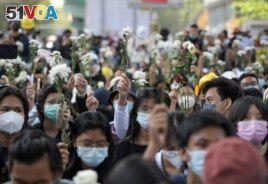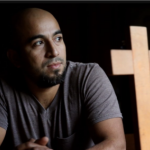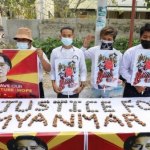24 February 2021
Indonesia began new diplomatic efforts Wednesday to end Myanmar's political crisis, as protests continued in Yangon and other cities.
Protestors are calling for the country's new military government to step down and for Aung San Suu Kyi's elected government to be returned to power.
Indonesia's Foreign Minister Retno Marsudi traveled to Bangkok, Thailand, where she held talks with Myanmar's recently named foreign minister, Wunna Maung Lwin. Thai Foreign Minister Don Pramudwinai also took part in the talks.
Indonesia is seeking to build an effort with neighboring countries to end the political crisis in Myanmar that began with a military coup on February 1.
Speaking to reporters after the talks, Marsudi said she had expressed her country's concern about the situation in Myanmar. "We asked all parties to exercise restraint and not use violence ... to avoid casualties and bloodshed." She noted the need for negotiation and trust-building to resolve the crisis.
Indonesia and others members of the Association of Southeast Asian Nations (ASEAN) are hoping to convince Myanmar's military to take actions to ease tension in the country and avoid violence.
The association believes negotiating with the military leaders will be more successful than sanctions, or other strong measures suggested by some Western nations.
However, there is worry among some pro-democracy activists that Indonesia's efforts to negotiate with Myanmar's military may legitimize the coup government. Reuters news agency reported this week that Indonesia had proposed sending ASEAN observers to make sure military leaders fulfill their promise to hold fair, new elections.

Demonstrators rally against the military coup in Yangon, Myanmar, February 24, 2021. REUTERS/Stringer
Protests in Myanmar continued on Wednesday, with a tense standoff taking place in Mandalay, the country's second-largest city. Armed police blocked the path of about 3,000 teachers and students for two hours. The teachers and students had played protest songs and listened to anti-coup speeches.
On Saturday, police and soldiers shot dead two people in Mandalay as they broke up a strike by port workers. Earlier in the same week, police used batons against demonstrators during a protest in front of a state bank.
Also Wednesday, about 150 people from a Christian group gathered in Yangon, Myanmar's largest city, to call for a return to democracy. The group also called for the release of Suu Kyi and other civilian leaders who have been held since the coup.
International pressure against the coup also continues. More than 130 pro-democracy groups released an open letter Wednesday to the United Nations Security Council calling for a halt to worldwide arms sales to Myanmar.
The letter said Myanmar's citizens have lost their democratically elected government and are experiencing human rights violations. Myanmar's military has a long history of committing human rights abuses.
The letter also states that the sale "of military-related equipment to Myanmar could provide the means to further repress the people of Myanmar in violation of international humanitarian and human rights law."
In addition, the letter says any Security Council measures should be followed up with "monitoring and enforcement."
China and Russia, both members of the security council, are among the top sellers of arms to Myanmar. It is expected that they would veto any effort by the U.N. to enforce a multi-nation arms ban.
I'm Susan Shand.
The Associated Press and the Reuters News Agency reported this story. Susan Shand adapted it for Learning English. Bryan Lynn was the editor.
_
Words in This Story
coup - n. a sudden attempt by a small group of people, often military members, to seize and takeover the government of a country often involving violence
sanction - n. restrictions, usually limiting trade, that are meant to cause a country to obey international law
legitimize – v. to make legitimate: in accordance with law or established requirements
baton – n. a heavy stick that is carried by police officers and is used as a weapon
monitor – v. to watch, observe, listen to, or check (something) for a special purpose over a period of time
We want to hear from you. Write to us in the Comments Section, and visit 51VOA.COM.










